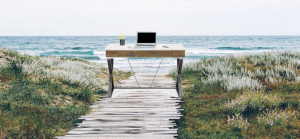
Large open windows with a cool breeze coming in, a plate of fresh fish with home-grown tomatoes, the sea pounding the cliffs in front of us while the children play on the beach and my mother has a snooze. A typical day at the office, right? If only.
However, whilst I have to acknowledge that this idyll is probably not possible within my current working environment, it did prompt me to ask why I think it is so impossible. Why shouldn’t we expect, and ask for, the improbable in our daily lives. Or even the impossible.
It took us some time to crawl our way out of the pond, lose our tails and stand on our feet and become the dominant species. So we got quite good as evolving as a species, managing to fight off all the competition and hungry sabre-tooth tigers, adapting to our surroundings and learning to use them to our advantage. All with the help of our larger brains and opposable thumbs.
It should come as no surprise then, that the places where we feel most comfortable, most relaxed and (dare I use the word) h a p p y are those which provides all of the elements in which we evolved so successfully. Fresh (clean) air on our skin, proximity to nature, fresh food, family; when did we forget, or choose to ignore, these fundamental building blocks to our wellbeing?
I suspect the answers lies somewhere between the Renaissance and the industrial revolution in the West. I don’t want to be too hard on progress; it did, after all, prolong our life expectancy, provide us with sanitation and healthcare, and eliminate a whole host of fatal illnesses amongst other helpful things. Somehow, though, it strikes me that along the journey between our hunter-gatherer lives and the shiny, air-conditioned boxes we live and work in now, we forgot to ask (or chose not to) whether this was a good idea for the mammal we are. The price of our purported productivity seems to have been our inherent emotional and physical health, in the widest sense of the word.
Let’s turn this on its head. If you were asked to design the perfect environment in which a new species might thrive, where would you start? With a list of questions about the species, no doubt: what does it need in order to thrive? Go on, have a go – and please send me a message if you end up with anything close to your current working environment, as I’d love to come and see it!
The desire to alienate ourselves from our mammalian roots seems particularly dominant in Westernized cultures; or put another way, the position of the human in the larger biosphere appears more rooted in Eastern cultures. The Victorians have a lot to answer for, driven by their incessant desire to demonstrate how far civilised man had managed to remove himself from his baser instincts. Cover up, button up and shut up. Undoing this is going to take some time.
The good news is that, with the help of the latest in efficiency-driven technology on our wrists and phones and desks, we are becoming increasingly aware of the invisible things around us. The air quality, our sleep patterns, even our heart rates and what impacts them. This awareness is driving a visible trend not only across the retail and life-style sector but also within the real estate industry, as tenants – correction, people who live and work in buildings – start to demand spaces in which they feel more comfortable, healthier, more productive and, yes, h a p p i e r.
This article is written by Philippa Gill, Partner at Verdextra, WELL AP & RESET ASP.